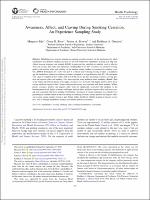Please use this identifier to cite or link to this item:
https://hdl.handle.net/20.500.12202/9401| Title: | Awareness, affect, and craving during smoking cessation: An experience sampling study. |
| Authors: | Sala, Margaret Roos, Corey R. Brewer, Judson A. Garrison, Kathleen 0000-0002-1560-649x |
| Keywords: | Awareness negative emotions mindfulness positive emotions Ecological Momentary Assessment craving smoking cessation tobacco smoking affect |
| Issue Date: | 2021 |
| Publisher: | APA: American Psychological Association |
| Citation: | Sala, M., Roos, C. R., Brewer, J. A., & Garrison, K. A. (2021). Awareness, affect, and craving during smoking cessation: An experience sampling study. Health Psychology: Ofcial Journal of the Division of Health Psychology, American Psychological Association, 40(9), 578–586. https://doi.org/10.1037/hea0001105 |
| Series/Report no.: | Health Psychology;40(9) |
| Abstract: | __Objective:__ Mindfulness has received attention in smoking cessation research, yet the mechanisms by which mindfulness may promote smoking cessation are not well understood. Mindfulness training may help individuals increase awareness and respond skillfully to processes that contribute to smoking, such as affective states and craving. This study used experience sampling (ES) to test how awareness was related to craving, positive and negative affect and smoking, in the moment, among smokers in treatment for smoking cessation. __Method:__ Participants (N = 228) were part of a clinical trial evaluating Craving to Quit, a smartphone app for mindfulness training for smoking cessation, compared to an app delivering only ES. All participants were asked to complete 22 days of ES, with up to 6 ES surveys per day, measuring awareness, craving, positive and negative affect and smoking. Data were analyzed using multilevel linear modeling. __Results:__ Both at the within and between-person level, higher awareness was associated with higher positive affect, lower craving and lower negative affect. Lower within-person craving was associated with lower smoking. Within-person awareness, positive and negative affect were not significantly associated with smoking. At the between-person level, higher awareness and higher positive affect, and lower negative affect and lower craving were associated with lower smoking. __Conclusions:__ Awareness of current experience was related to key psychological variables linked to behavior change in smoking cessation, namely positive and negative affect and craving, among smokers trying to quit. Future studies should test whether learning to increase awareness, such as through mindfulness training, may benefit smokers in treatment. (PsycInfo Database Record (c) 2021 APA, all rights reserved) |
| Description: | Scholarly article / Open access |
| URI: | https://ezproxy.yu.edu/login?url=https://search.ebscohost.com/login.aspx?direct=true&AuthType=ip,sso&db=pdh&AN=2021-85871-001&site=eds-live&scope=site https://hdl.handle.net/20.500.12202/9401 |
| ISSN: | 0278-6133 (Print) 1930-7810 (Electronic) |
| Appears in Collections: | Ferkauf Graduate School of Psychology: Faculty Publications |
Files in This Item:
| File | Description | Size | Format | |
|---|---|---|---|---|
| Sala 2021 OA Awareness.pdf | 220.21 kB | Adobe PDF |  View/Open |
This item is licensed under a Creative Commons License

